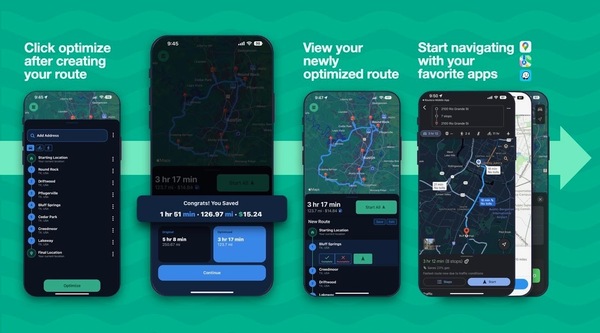
LUKE BLAZEK
| Company Founded: | Routora | Anticipated Graduation: | Class of 2025 |
| Title: | Co-founder & CFO | Degree: | BA, Economics (Class of 2025) |
| Location: | Notre Dame, IN | Residence Hall: | Pangborn Hall |
BRIAN GEORGE
| Company Founded: | Routora | Anticipated Graduation: | Class of 2025 |
| Title: | Co-founder & COO | Degree: | BBA, Finance & History (Class of 2025) |
| Location: | Notre Dame, IN | Residence Hall: | Pangborn Hall |
What problem do gig delivery drivers, real estate brokers, insurance claims adjusters, home health workers, and foodservice companies have in common?
They spend too much time and money on the road going from place to place to place to place. And in tight economic times, who has time and money to waste?
That pain point and how best to solve it led to a trio of co-founders to launch Routora in June 2022, a startup developing an artificial intelligence-powered routing app. Now, 15 months later, University of Notre Dame students Brian George and Luke Blazek and University of Texas at Dallas student Tom Vazhekatt, are poised for the official hard launch of their multi-stop routing app for iOS and Android on September 28.
And just as the Routora app makes life easier for drivers by making complex routes simple, this trio of first-time entrepreneurs have leveraged their friendship and academic studies to thoughtfully plot out and execute their company. It’s a story that begins years ago in Dallas, Texas, the hometown of the co-founders.
“I’ve always loved building my own apps to make my life easier. I once create an app that let me silence ads on Spotify,” says Vazhekatt. “In high school, I had an idea for another app thanks to my parents who would have me run errands for them. It was so time-consuming driving around Dallas that I decided to someday figure out a way to make running errands more efficient.”
Thinking apps were expensive to develop, Vazhekatt tucked the idea away until college when he faced the problem again, while working with a nonprofit challenged with delivery-related efficiency issues. He began working on an idea and in spring 2022, shared it with his childhood friend, Brian George. The two had attended the same church growing up and stayed in touch after high school.
George recalls when Vazhekatt sprang the idea and prototype for Routora on him. “Tom approached me in the spring of 2022 with this side project he'd been tinkering with. The problem of more efficient multi-stop routing he was trying to solve resonated with me and I was immediately hooked. I could clearly envision its potential to not only be a solution for me but also for countless others out there.”
Recognizing the brilliance of Vazhekatt’s idea and what he had developed to date, George shared it with a fellow Notre Dame dorm mate and friend, Luke Blazek. “I knew Luke's passion for entrepreneurship would provide the kind of feedback and insights we needed to shape and refine this budding product.”
While a passion for entrepreneurship was his gateway to Routora, Blazek does not profess to having had a long-term interest in startups. He chose Notre Dame for more holistic reasons: its Catholic traditions, football, dorm life, and its robust business school. It was not until he arrived on campus that he discovered the Notre Dame IDEA Center, which encourages and supports entrepreneurship among students, faculty and the greater South Bend community.
“I’ve always been creative and like collaborating with others on big ideas. Resources at Notre Dame like the IDEA Center opened the door to entrepreneurship and I’ve embraced it. When Brian and Tom invited me to get involved, it was off to the races for me,” Blazek says.
Skeptics might ask, “Does the world need another route-finding app? Don’t we already have (and love) Waze, Google Maps and Apple Maps?”
The answers to those questions are yes and yes. The simple reason being is the three popular established apps are designed to take one from point A to point B. Routora, on the other hand, is designed to help those with multiple destination—A, B, C, D, E and on to Z—quickly identify the fastest, most efficient routes for multiple destinations. In addition to saving time and money on fuel, route optimization also helps users reduce their carbon footprint.
But here’s the really cool part. Once Routora optimizes the route by automatically re-ordering stops, its interface with Waze, Google Maps, and Apple Maps allows the user to jump back to their preferred app.
With this concept, the Routora team entered the 2023 McCloskey New Venture Competition hosted by the IDEA Center. Although they did not win any awards, Blazek says the experience was extremely helpful and has helped them tap into a wealth of IDEA Center resources.
“We received a six-week mentorship, support from the IDEA Center team and introductions to professionals like attorneys,” Blazek says. “It really set us up for the next step in our journey.”
That step was a beta test of Routora. In March 2022, Routora’s website went live and gave users the ability to try Routora by adding an extension available on the Google Chrome Web Store to their smart phones. The site also gave visitors the option of joining a waiting list for the Routora app, which at the time, was under development. To drive traffic to the website and start building a user base and wait list, Blazek says the team turned to social media.
“The response we got was impressive. With a purely organic effort, we got 20 million impressions on TikTok, Instagram and Reddit. We also landed 7,000 users on our app wait list,” he says.
There was a twist to the wait list. To be added, people had to tell Routora how they planned to use the app. This requirement proved to be a powerful market research tool.
“Developers will often build what we think is cool, but you have to talk to users to find out what they need so you can build it. Communication is key,” says Vazhekatt.
Among the findings was users would also like to use Routora while riding a bike or walking. “We didn’t consider this at first, but getting that feedback showed it’s a big need for large cities like Los Angeles, Dallas, and New York where you have a lot of couriers, commuters who use bikes and tourists,” Vazhekatt explains.
Up until late spring 2023, Vazhekatt had done all of the development himself. As a Computer Science major, he enjoyed the experience, but needing to accelerate development of the Routora app, the co-founders brought on three developers. This also allowed for a build out of functionality, which is still ongoing. New functionality allows for users to save routes, track completed trips and calculate fuel savings.
Blazek says they are currently working on automating the input of a user’s stops so that instead of manually entering them, a slow and cumbersome process, a camera on the app will capture the information, populate the stops and deliver the ideal route within seconds. “Think of a real estate agent with 10 showings in a day. No more typing in all those addresses. Routora does it all.”
The team is also working on a solution for companies or nonprofits with fleets of trucks to efficiently allocate drivers and routes. “We have the tech built out, we just need to add it to the app,” Vazhekatt says.
Routora silently launched the app on the App Store under the radar in mid-July 2023. Only family and friends were alerted. This was done to test the app and address any bugs. Yet even in stealth mode, hundreds of users found it, much to the delight of the co-founders.
Startups don’t build themselves; funding is required to make things happen. Blazek, George, and Vazhekatt have literally worked on a shoestring budget, leveraging their own programming, social media and marketing talents. They raised a small amount of seed money from friends, family and a Notre Dame faculty member. Last May, the team competed in the Blackstone Pitch Competition hosted by the Institute for Innovation and Entrepreneurship at the University of Texas at Dallas. Team Routora won the student category, taking home $25,000.
The co-founders proceeded with a soft launch on September 14. An invitation was sent to 2,500 iPhone users on their wait list. Users were offered a seven-day free trial and a $17.99 a month paid subscription. With no paid promotion, 1,000 users downloaded the app. Within a few days, Routora was among the Top 200 navigation apps listed on the App Store.
Next up is the hard launch set for September 28. In addition to iOS, Android users will have the ability to download the Routora app. One of the big differences in the soft and hard launches is the co-founders will spend marketing dollars for the first time.

“We have relied entirely on organic social media promotion so far,” Blazek says. “And it’s worked well. We’ve gotten 15 million views on Instagram and Reddit has been super effective in helping us secure 20,000 beta users. For the hard launch, we’re emailing our beta users, doing a paid press release to reach major media, partnering with an app called Gridwise that reaches gig delivery drivers, and paid posts on YouTube.”
More social media outreach is planned for the future. “We may do a co-promotion with a TikTok influencer who runs “GoogleMapsFun” with 10 million followers,” Blazek adds.
Balancing life as student entrepreneurs—Blazek and George are juniors, Vazhekatt is a senior—has been challenging but not impossible. Much of the work aligns with their majors: Computer Science, Economics and Finance. “I’ve been putting my accounting and entrepreneurship classes to good use with Routora,” says Blazek. “But I also love Notre Dame football and student life so it’s hard at times, but the experience is worth it.”
The biggest challenge to date for Routora’s co-founders has been determining what differentiates their routing app from others. “We are niche solution and route optimization is a vague term. So we have to explain what we do simply and package our communications so it’s digestible for people. We also have to overcome those who say Google already does what we’re offering.”
George adds, “We’re blessed to have these avenues, social media, to get a lot of feedback. We’ve been filtering through comments to get to the common problems and adapt.”
The three co-founders agree that the biggest win to date has been launching the app. “Knowing that Routora has more users than the American Airlines Arena holds for a Dallas Mavericks game, is pretty crazy. Reaching 20,000 users so quickly is big for us,” Blazek says.
Adds George, “The numbers from our beta test on Google Chrome are impressive. We saved drivers more than one million miles, 15,000 hours of drive time, $200,000 in fuel costs, and 430 kilograms of carbon emissions. We also just surpassed 20,000 users from over 90 countries.”
Vazhekatt says at the beginning of Routora’s journey he was obsessed with numbers but feedback from individual users has changed that. “People telling us how we’re impacting and improving their lives is powerful. Things like having more time with family. That shows we’re making a difference.”
Routora’s co-founders offer this advice to fellow students who want to start a company. “Do your research and find out what’s worthwhile. Once to do that, have fervor, conviction, and the flexibility to pivot. While it’s important to have goals, know you have to adapt as you learn.”